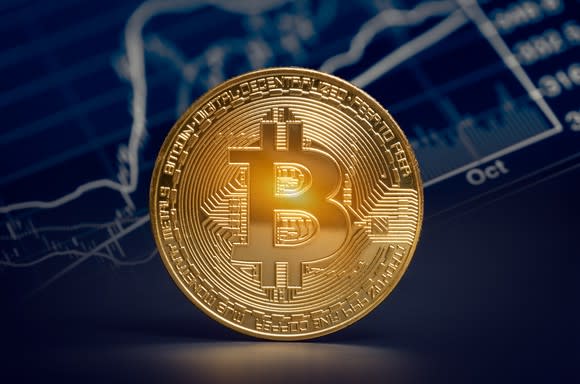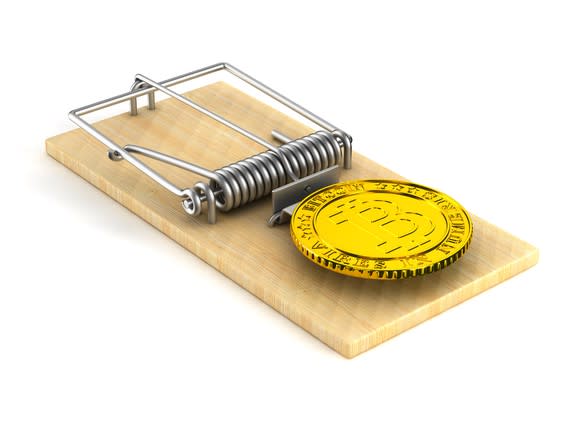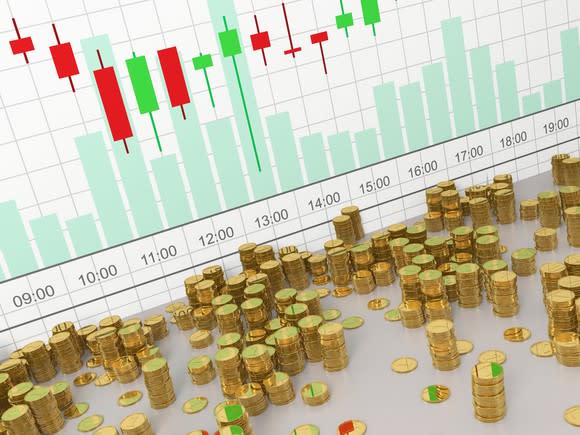This Statistic Shows Why Bitcoin Is Yesterday's News
Cryptocurrencies absolutely put on a show for Wall Street and investors in 2017. From when the year began to when it came to a close, the aggregate market cap of digital currencies had risen by nearly $600 billion, or more than 3,300%. It very well could be the greatest year in history for a single asset class.
Though there are numerous catalysts responsible for the sprint higher in valuations, a lot of credit is often bestowed on bitcoin for heralding the rally. Bitcoin was the first cryptocurrency to come to market, and it's also credited with pushing blockchain technology -- the digital, distributed, and decentralized ledger tethered to digital coins that records all transactions -- into the spotlight. Today, it remains the most popular cryptocurrency in the world with merchants, and it's still the most valuable digital coin by market cap at around $190 billion.

Image source: Getty Images.
Bitcoin's cryptocurrency dominance is dwindling
However, bitcoin's dominance in the cryptocurrency space may be dwindling. After consistently comprising 74% to 96% of the aggregate crypto market cap between 2013 and March 2017, bitcoin's share of aggregate market cap has remained below 40% for nearly two months now. Meanwhile, other digital currencies, such as Ethereum and Ripple, have gained significant ground in terms of market cap.
What's the issue with bitcoin, you wonder? The answer looks to be tied to its blockchain. Once the premier infrastructure that every new digital currency aimed to duplicate, bitcoin's blockchain is now somewhat stodgy and dated. Worse yet, its massive open-source network makes reaching consensus (i.e., 80% support) on software upgrades incredibly difficult. A lack of consensus is what's led bitcoin to fork into separate cryptocurrencies on a handful of occasions. The result is an incredibly slow and costly network.
Though there are numerous perceived advantages of blockchain technology for the financial services industry, the two most important are that transactions are supposed to be cheaper since there are no banks acting as middlemen, and that transactions should be settled significantly faster since they're being proofed 24 hours a day, seven days a week. With regard to bitcoin, its transactions are taking longer than an hour to settle, on average, and they're costing around $28. That's virtually the same cost as a bank wire transfer. By comparison, transaction speed analyses have found that virtually every other digital currency is running circles around bitcoin in terms of cost and speed.

Image source: Getty Images.
This metric suggests that bitcoin is in deep trouble
Bitcoin's biggest asset is its name. Being accepted by more merchants, and having the greatest exposure of any digital coin on cryptocurrency exchanges, has given it clear advantages. Unfortunately, one metric suggests that bitcoin is stuck in neutral while its competitors are poised to leave it in the dust.
Using data from BitInfoCharts.com (link opens chart), I compared bitcoin, Ethereum, Ripple, and Litecoin in terms of total transactions per day. Understand that these transactions include buying and selling on exchanges, as well as medium of exchange transactions for goods and services. Also keep in mind that token price, block size, and hash rate can impact the total transactions per day in each of these virtual currencies (i.e., it's a lot easier to buy an XRP coin trading for around $1 than it is to buy bitcoin at $10,000 per token).
If you've clicked on the chart, you've probably seen that Ripple conducts far and away more transactions a day, followed closely by Ethereum, then bitcoin and Litecoin, in that order, much further behind in terms of aggregate transactions. But it's not the aggregate transactions that stands out. It's the trend.
For roughly 26 months now, bitcoin has been conducting between 180,000 and 340,000 transactions per day. Though there have been a few very short-lived blips up or down, bitcoin's daily transactions have basically been stuck in neutral for more than two years. Meanwhile, the average number of Ripple transactions has almost tripled in that time, and Ethereum, which had been averaging between 40,000 and 50,000 transactions per day in 2016 and early 2017, now consistently averages around 800,000 transactions per day.

Image source: Getty Images.
What this all means
It is possible this data could be somewhat benign and simply suggest that investors have cycled out of bitcoin and into other cryptocurrencies in the hope of finding the "next bitcoin." This increase in transaction count may relate to heightened trading activity.
However, it may also imply that bitcoin's sluggish network is affecting its ability to attract investors and enterprise customers. Not taking into account block rates, HowMuch.net recently conducted a study of transaction speed per second on bitcoin and a few other digital currencies. It found that Ripple was over 200 times faster (up to 1,500 transactions per second) than bitcoin, with Litecoin and Ethereum about eight and three times as fast as bitcoin, respectively.
What's more, payment processor Stripe, which was the first payment processor to jump aboard and accept bitcoin on its platform, announced in January that it'd be booting bitcoin from its platform as of April. Stripe views bitcoin more as an asset to be bought and held rather than as a medium of exchange.
In short, we may be witnessing the slow sunset of bitcoin and the emergence of a new wave of crypto leaders.
More From The Motley Fool
Sean Williams has no position in any of the stocks or cryptocurrencies mentioned. The Motley Fool has no position in any of the stocks or cryptocurrencies mentioned. The Motley Fool has a disclosure policy.

 Yahoo Finance
Yahoo Finance 